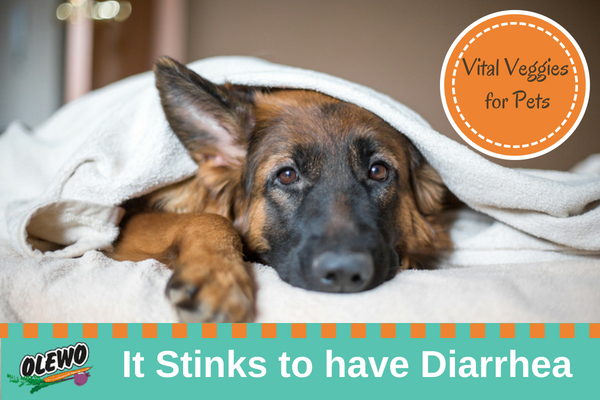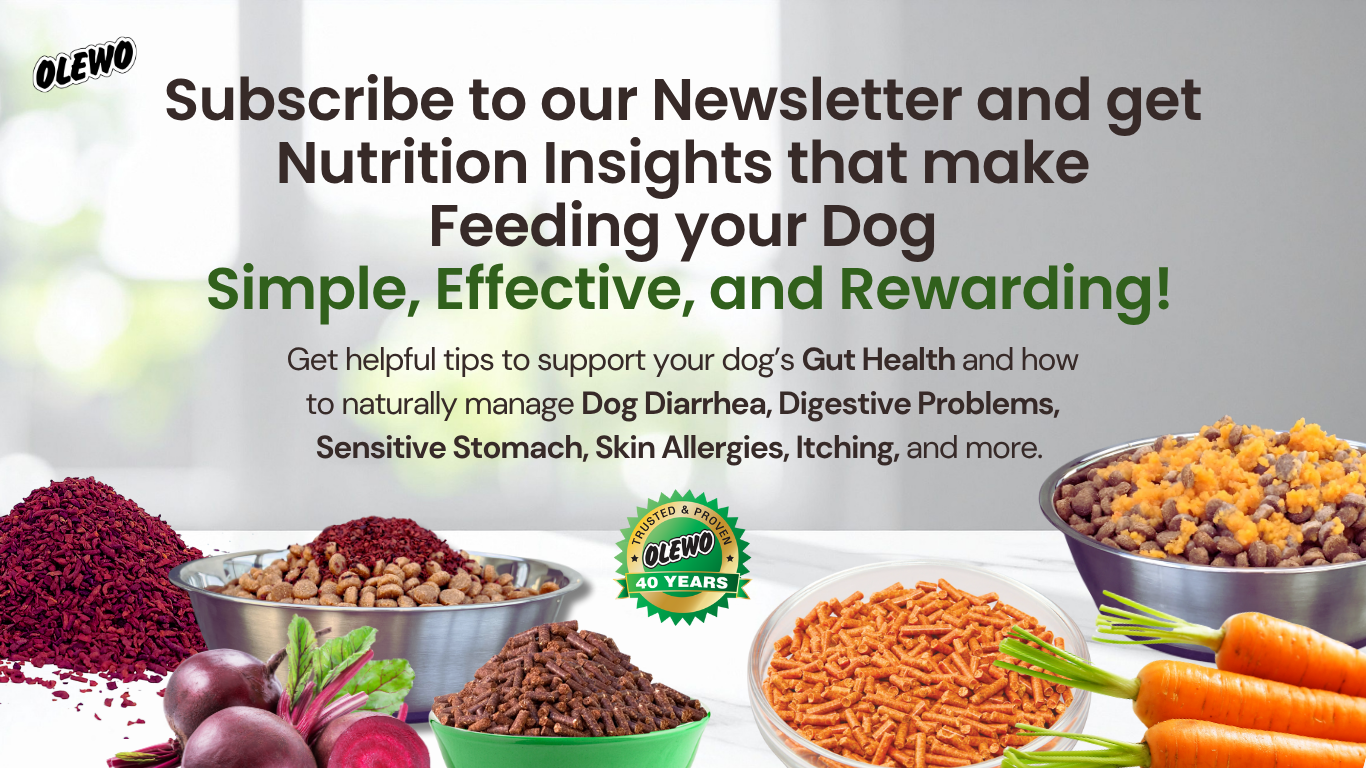
Do you like having diarrhea? Of course not! Neither does your dog. If dogs could talk, they would definitely say “It sinks to have diarrhea!”
Causes for Dog Diarrhea
Dog diarrhea is one of the most common ailments, and one of the top reasons for vet visits. All pet owners have been in this situation before. Suddenly your dog has diarrhea, and you are not sure whether to wait a day or two or take your pet to the vet right away.
The most common reason for dog diarrhea is probably dietary indiscretion, meaning your dog got into something he shouldn’t eat, or got into the garbage and ate some rotten food. In addition, there are many more causes for dog diarrhea including:
- Change in diet
- Food intolerance, sensitivity, allergy
- Maldigestion, malabsorption
- Certain medications
- Colitis
- Stress
- Bacterial or viral infection
- Fungal infection
- Toxins
- Intestinal parasites
- Inflammatory bowel disease
- Small intestine bacterial overgrowth (SIBO)
- Irritable bowel syndrome
- Diseases of the pancreas, liver or kidneys
- Leaky gut
- Cancer or tumors in the digestive tract
General Symptoms of Dog Diarrhea
- Frequent loose or liquid stools
- Changes in volume of stool
- Straining to defecate
- Bloating and flatulence
- Blood or mucus in stool
- Lethargy
- Dehydration
- Vomiting
- Decreased appetite
- Weight loss
Concerns with Dog Diarrhea
When a pet has diarrhea, it is not properly absorbing the nutrients from its diet, which can lead to weight loss and an imbalance of electrolytes that can lead to severe consequences such as dehydration if left untreated. It is especially important to avoid recurring diarrhea in puppies and young dogs because it can inhibit their growth.
Paying Attention to your Dog’s Poop
What your pet eliminates from its body is as important as what it takes in. Just like with humans, you can learn a lot about your dog’s health by taking a closer look at the stools. Stool frequency and condition tell the story of what is going on in your pet’s system. When inspecting your dog’s poop, just remember the 4 Cs: Color, Consistency, Coating and Contents.
Color
Healthy dog poop should be chocolate brown in color. While some variation in stool color is normal, certain colors can definitely indicate a problem.
- Black & Tarry: May be a sign of old blood somewhere in the dog’s digestive system from an injury or indiscriminate eating, but may also be a sign of serious disease.
- Gray & Greasy: Can be a sign of too much fat in your dog’s diet, which can trigger pancreatitis.
- Green: May indicate your dog is eating grass, possibly to soothe an upset stomach.
- Red streaks: This is more than likely a sign of current bleeding, typically from the large intestine, anus, or anal glands. Take your dog to the vet right away as it is often a sign of a serious health problem requiring immediate attention.
- While spots: Small white spots in the stool could be an indication your dog has worms.
- Yellow: This might indicate problems with the liver, pancreas, or gallbladder.
Consistency
Healthy dog poop should be somewhat firm in consistency, similar to play dough. Although some dogs have naturally softer stool than others, your dog’s poop should be able to hold its form. When your dog’s stool gets too soft and not holding its form, or he starts having liquid stools, especially when it lasts for more than one day, you should contact the vet.
Coating
Healthy dog poop should have no coating and shouldn’t leave any sort of trail behind when picking it off the ground. If your dog’s poop has a mucus-like coating, this could indicate large bowel inflammation, but may also indicate the presence of parvovirus or parasites. On rare occasion, I have seen mucus on my dogs’ poop, which I believe can be caused by stress, and it was always just a one-time occurrence. If you notice mucus on your dog’s stool more than once, and for more than one day, you should definitely contact your vet.
Contents
I think all dogs like getting into things they shouldn’t whether it is food or foreign materials such as parts of toys, clothes, shoes, rugs, and even money. It is unbelievable what dogs can ingest sometimes, but usually what goes in comes out just fine. It is a good idea though to keep an eye on the contents of your dog’s stool and be on the lookout for strange items. It is possible for dogs to get foreign objects stuck in their digestive tract that need to be surgically removed. One time I was in the vet’s waiting room during Christmas time, and there was a pet owner waiting for her dog to have surgery because he had ingested some Christmas decorations.
How to Treat Dog Diarrhea
Most healthy dogs experience occasional episodes of loose stool or diarrhea that normally resolves with 12 to 24 hours. In most cases, this is caused by indiscriminate eating, changes in diet, or stress.
Adult Dogs
If your dog is an adult and otherwise healthy and behaving normal, then it is typically safe to simply keep an eye on the dog to insure the stools return to normal within a day or so. It is best to feed a bland diet like cooked ground chicken or ground turkey with Olewo Carrots mixed in. Feeding 2 to 3 small meals a day is also a good idea until the stools are back to normal. Many Vets recommend feeding chicken and rice, but I agree with Dr. Karen Becker that rice is not really the best option:
Rice, even though it’s bland, is very fermentable. Fermenting rice in the colon of a pet with diarrhea tends to increase gassiness. Also, rice tends to just zip right through the GI tract, exiting with the next bout of explosive diarrhea totally undigested.
Olewo Carrots on the other hand, are soothing and calming to the digestive tract and help resolve dog diarrhea often after just 2 feedings. It is also a good idea to make Olewo Carrots part of your dog’s regular diet. Only 1 spoonful of these carrots added to your dog’s daily meals can keep the digestive system healthy to avoid loose stools and dog diarrhea, anal gland issues, and intestinal parasites.
Puppies
If you have a puppy with diarrhea, it is extremely important to pay close attention and to make sure the diarrhea gets resolved quickly. They tend to dehydrate quicker and diarrhea, especially recurring diarrhea, can have a detrimental affect on a puppy’s growth and overall health. Puppies have difficulties processing new foods and any change in diet can cause diarrhea. Therefore, it is best to keep them on a consistent diet until they are old enough to start eating adult food.
Olewo Carrots are especially good for puppies because they tend to have more episodes of diarrhea than adult dogs. Not only do these carrots help resolve puppy diarrhea quickly and help with transitioning foods, Olewo Carrots also strengthen the immune system, help prevent infections, and promote bone and tissue growth.
Keeping your Dog Hydrated
One of the biggest risks associated with dog diarrhea is dehydration. Keeping your dog or puppy hydrated is of utmost importance. In case your dog is not interested in drinking, you need to use a syringe to get the water into your dog’s system.
When to Take your Dog to the Vet
If there is any change in your dog’s behavior, if he is sluggish, running a fever or feels warm to the touch, you should contact your veterinarian.
Anytime you see blood in your dog’s stool or he appears to be weak, you should make an appointment with the vet.
If your dog appeared healthy otherwise, but the diarrhea did not resolve after a day or two, you should contact your veterinarian.
It’s a good idea to bring a sample of your dog’s stool to your appointment, even if it’s watery. This will help your vet identify potential underlying causes for the diarrhea.


Leave a Reply